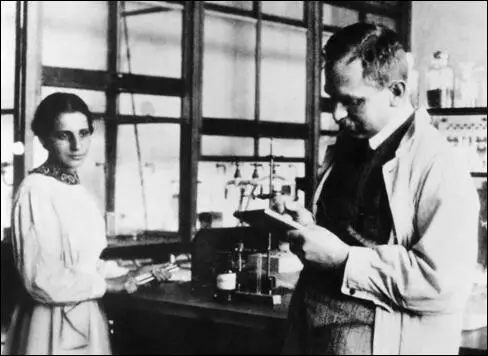Otto Hahn
Otto Hahn, the son of a glazier, was born in Frankfurt am Main, Germany, on 8th March, 1879. He studied chemistry at the University of Marburg and obtained his doctorate in 1901. Afterwards he became a lecturer at the university.
In 1904 he went to London to study at University College where he carried out research into radioactivity. He later moved to Montreal where he worked under Ernest Rutherford.
Rutherford returned to Germany in 1906 where he began work with Lise Meitner at the Kaiser Wilhelm Institute for Chemistry. Hahn now became head of the radiochemistry department.
On the outbreak of the First World War Hahn was recruited into the German Army. His scientific knowledge was acknowledged and he became a chemical-warfare specialist and organized the use of Chlorine Gas and Mustard Gas against British and French troops.
After the war Hahn resumed working with Lise Meitner and together they discovered protactinium (1918) and nuclear isomers (1921). Over the next few years they devoted their time to researching the application of radioactive methods to chemical problems.
In the 1930s Hahn became interested in the research being carried out by Enrico Fermi and Emilio Segre at the University of Rome. This included experiments where elements such as uranium were bombarded with neutrons. By 1935 the two men had discovered slow neutrons, which have properties important to the operation of nuclear reactors.

Hahn and Lise Meitner were now joined by Fritz Strassmann and discovered that uranium nuclei split when bombarded with neutrons. In 1938 Meitner, like other Jews in Germany, was dismissed from her university post. She moved to Sweden and in 1939 wrote a paper on nuclear fission with her nephew, Otto Frisch, where they argued that by splitting the atom it was possible to use a few pounds of uranium to create the explosive and destructive power of many thousands of pounds of dynamite.
During the Second World War Hahn and Fritz Strassmann continued to work in the field of nuclear physics but they made no attempt to turn their knowledge into a military weapon. Hahn had a strong dislike for Adolf Hitler and his government and told a friend: "If my work would lead to Hitler having an atomic bomb I would kill myself."
In April, 1945, Allied forces arrested German scientists such as Hahn, Werner Heisenberg, Carl von Weizsacker, Max von Laue, Karl Wirtz, and Walter Gerlach. These men were now taken to England where they were questioned to see if they had discovered how to make atomic weapons.
When he was released Hahn became president of the Max Planck Society for the Advancement of Science. In 1966 Hahn shared with Lise Meitner and Fritz Strassmann the Enrico Fermi Award. Otto Hahn died in West Germany on 28th July, 1968.
Primary Sources
(1) Hans Geiger was in the German Army with Otto Hahn during the First World War. In 1917 he wrote a letter to Ernest Rutherford.
I think nearly everyone of my colleagues whom you know is in the field. Dr. Rumelin (also Reinganum and Glatzel) fell in one of the first months of the war. W. H. Schmidt is also dead; but from what I have heard he must have been in a very bad and hopeless condition all last year and so it was perhaps the best for him. I sometimes hear from Professor Hahn who seems to stand the dangers of war very well and is apparently quite happy in his military position.
(2) While in England the captured German scientists were secretly taped to discover how much they knew about atomic weapons. This included Otto Hahn, Werner Heisenberg, Carl von Weizsacker, Max von Laue and Karl Wirtz.
Otto Hahn: If the Americans have a uranium bomb then you're all second-raters.
Werner Heisenberg: Did they use the word uranium in connection with this atomic bomb?
Otto Hahn: No.
Werner Heisenberg: Then it's got nothing to do with atoms, but the equivalent of 20,000 tons of high explosive is terrific. All I can suggest, is that some dilettante in America knows it has the equivalent of 20,000 tons of high explosive and in reality, it doesn't work at all.
Otto Hahn: At any rate Heisenberg, you're just second-raters, and you may as well pack up.
Werner Heisenberg: I quite agree. I am willing to believe that it is a high pressure bomb and I don't believe that it has anything to do with uranium but that it is a chemical thing where they have enormously increased the whole explosion.
Karl Witz: I'm glad we didn't have it.
Carl von Weizsacker: I think it's dreadful of the Americans to have done it. I think it is madness on their part.
Werner Heisenberg: One can't say that. One could equally well say, "That's the quickest way of ending the war."
Otto Hahn: That's what consoles me.
Werner Heisenberg: I believe the reason we didn't do it was because all the physicists didn't want to do it, on principle. If we had all wanted Germany to win the war we could have succeeded.
Otto Hahn: I don't believe that, but I am thankful we didn't succeed.
Last updated: 3rd May, 2001

